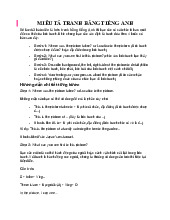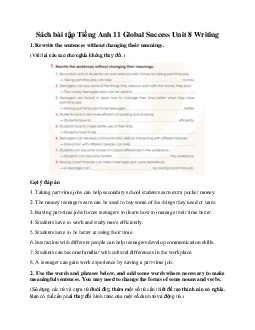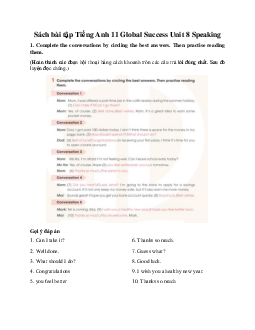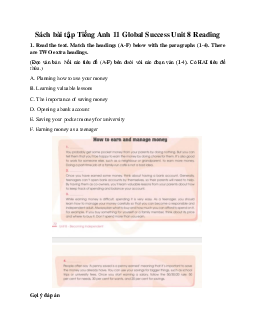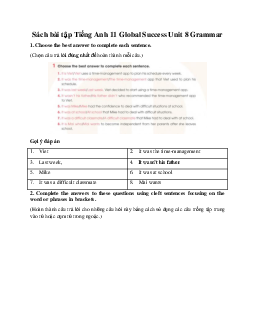


Preview text:
Tiếng Anh 11 Global Success Unit 8 Writing
An article about pros and cons of self-study
(Một bài báo về những ưu điểm và nhược điểm của việc tự học)
1. Work in pairs. Read the following ideas and decide if they are pros or cons of self-
study. Think of other pros and cons to add.
(Làm việc theo cặp. Đọc những ý kiến sau đây và quyết định xem chúng là ưu hay nhược
điểm của việc tự học. Hãy nghĩ về những ưu và nhược điểm khác để thêm vào.) Gợi ý đáp án Pros
- Freedom: Self-study provides learners with the freedom to choose what, when, and how
they want to learn. They can personalize their learning experience, explore their interests, and learn at their own pace.
- Responsibility: Self-study promotes self-discipline and responsibility. Learners are
accountable for their learning, and they must develop the motivation and commitment to complete their studies.
- Confidence: Self-study helps learners build confidence in their abilities. They learn to
rely on themselves, become more independent, and feel more accomplished when they achieve their learning goals.
- Flexibility: Self-study is flexible and convenient. Learners can study anytime and
anywhere, and they can easily adjust their learning schedule to fit their lifestyle. Cons
- Lack of support: Self-study can be isolating, and learners may not have access to the
same level of support and guidance as they would in a traditional classroom. They may
struggle to stay motivated without the encouragement of a teacher or mentor.
- Time-consuming: Self-study requires learners to spend more time planning, researching,
and organizing their studies. They may also need to spend extra time solving problems on
their own, without the benefit of a teacher's guidance.
- Limited practical skills: Self-study may focus too much on academic skills and neglect
practical skills that are essential for everyday life. For example, learners may be
proficient in writing essays, but struggle with basic tasks like cooking or home maintenance.
- Limited social interaction: Self-study can limit learners' opportunities for social
interaction and collaboration. They may miss out on the chance to share ideas, learn from
peers, and build relationships with teachers and mentors.
- Lack of feedback: Self-study may lack feedback and assessment. Learners may not
receive regular evaluations of their progress, which can make it difficult to identify areas
of weakness and improve their learning.
2. Write an article (150-180 words) about the pros and cons of self-study. Use the
ideas in 1 and the outline with useful expressions below to help you.
(Viết một bài báo (150-180 từ) về ưu và nhược điểm của việc tự học. Sử dụng các ý
tưởng trong phần 1 và dàn ý với các cách diễn đạt hữu ích bên dưới để giúp bạn.) Gợi ý đáp án
Pros and Cons of Self-Study
Independent learning is becoming increasingly popular and often involves self-study.
Self-study allows learners to study at their own pace and on their own schedule, without
the need for a teacher or mentor. However, like everything else in life, self-study has both
its advantages and disadvantages.
Firstly, self-study gives learners the freedom to decide what to study and how. It also
promotes responsibility by allowing learners to set their own goals and make plans to
achieve them. Secondly, self-study can make learners more confident in their abilities to
complete tasks independently. Finally, self-study can be a cost-effective alternative to
traditional education, as learners can save money on tuition and other expenses.
On the other hand, learners may struggle to learn things on their own and may need more
time to understand concepts without the guidance of a teacher. Additionally, learners may
not develop certain life skills, such as good communication and relationship skills.
Finally, learners may not learn practical skills if they focus too much on learning academic skills.
In conclusion, self-study has both pros and cons. Learners should understand both and
find a balance between the two. As education is changing all the time, it is important for
learners to get used to the challenges of self-study and take advantage of the benefits it offers.
